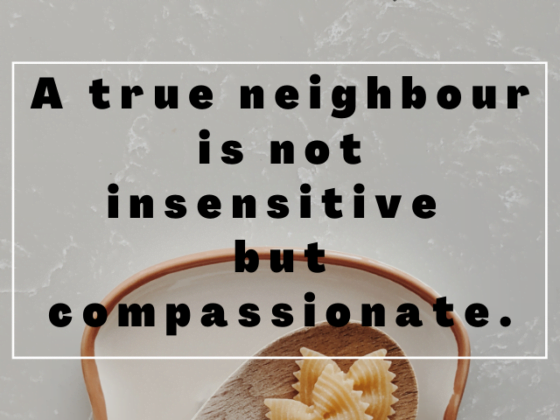Asking more and talking less: a skill to learn
You can tell whether a man is clever by his answers. You can tell whether a man is wise by his questions.
Naguib Mahfouz
The above quote from Naguib Mahfouz, an Egyptian writer and Nobel laureate, translates in Italian language as “Potete giudicare quanto è intelligente un uomo dalle sue risposte. Potete giudicare quanto è saggio dalle sue domande.” I had to translate because the Italian language seems to do more justice to this profound quote than the English language does.
One of the attitudes of the disciples of Jesus that fascinates me was their habit of asking questions. The Holy Bible cites many occasions when Jesus would tell a parable or say something in public that wasn’t easy to understand. But once they retired in the evening, His disciples would constantly pester Him for elucidations.
Oftentimes we’re in a haste to show how much we know. This is done with the mind to impress those in front of us, so they’d believe that we’re knowledgeable in a subject matter. In our minds, such displays of knowledge make us stand out.
Knowledge is a form of influence and power, and just like other forms of power, it can fascinate and entice but can also repel and turn off. A wise man therefore would ask more and talk less.
Asking more questions however, doesn’t make you wise if they lack certain ingredients. So, here are a few tips that might help you transition from just sounding intelligent to becoming wise:
1. Genuinely desire to know more about your talking partner.
Humans want to be recognised; we want our opinions sort after and valued. Many people don’t get asked for their opinion on many, if any, subjects. So, seeing a person who genuinely shows interest in them and solicits for their views is a huge thing for them. And this irrespective of their social status.
2. Prepare relevant interesting questions.
I’ve seen that job interviewers are also excited when you show how interested you are about the job through the questions you ask. There’s a good probability that each applicant for that position has the required hard skills. But a soft skill such as asking pertinent interesting questions might be what will differentiate you from the rest. And there’s a higher chance you’ll get selected over someone who doesn’t.
3. Know his or her interest beforehand, if possible.
Whether it is a dinner event or a job interview or a meeting with an important personality, you want to find out a thing or two about the person(s) you’ll be meeting. Things like their business interests, hobbies, values, philanthropic gestures, etc are often areas of high yield. That is, reading a few things up on these can help you have an interesting conversation that will remain memorable and open a few doors.
4. Know when to come in.
Timing is very important when you want to add something to a discussion. Everyone likes the other party to listen raptly when he or she is talking. That’s human nature – we want someone to pay attention when we express our thoughts. So, if you must interject, right timing is important. The person might be saying something that is vital, but if you cut in at the wrong moment, you interrupt the thought flow and that might be a turn off.
5. Let your goal guide the discussion.
Let’s assume you’re meeting with your mentor or someone you admire and wish to learn from, you must have a goal in mind. It is that goal that should guide the discussion while leaving room for flexibility. Granted that you don’t want to continually interrupt the thought flow of your mentor, but sitting down for hours to listen to his or her sexual escapades may not be necessary except they are told to teach some vital lessons
6. Avoid sensitive questions
Avoid sensitive topics like things regarding a person’s health, wealth or even some negative past life. People go into their shells the moment you bring up sensitive matters regarding their dirty past life or you become too inquisitive about their material wealth or medical records. There’s no need for those. If they’re necessary, they’ll let you in without much hassle.
7. Be exhaustive but concise in your questions.
Your interlocutor needs to understand your questions before he or she can give an appropriate and adequate answer. However, you don’t want to spend the entire time asking your questions and be left with no time getting answers. So, be exhaustive but concise.
8. Don’t ask in an attempt to show the ignorance of your interlocutor.
This is a deliberate mistake some intelligent or clever people make. In order to prove that their talking partner knows little in a given area or rather, to show the depth of their knowledge, they ask foolish questions. They ask questions with the intent to expose the shallow knowledge of those they’re talking with. It’s absolutely unnecessary.
9. Don’t ask as a novice nor as an expert who needs no further tutoring; avoid both extremes.
Know enough to ask something interesting and have a mind that is ready to imbibe new ideas. ‘Over sabi’ (arrogant display of knowledge) is a turn off for most people. Even when your opinion is requested, know when you’ve answered and exercise restraint.
10. Be humble about what you know and what you can do.
Humility will always remain a virtue as long as the earth remains. Beside being a gift of the Holy Ghost, humility also happens to be a skill that earns great rewards. Pride on the other hand makes you extremely vulnerable because if your ego can be easily hurt, then you may never go far in your relationships with people. Knowledge is important but wisdom demands that the more you grow in knowledge, the more you should grow in humility.
11. Finally, add some humour.
There’s hardly any person that doesn’t enjoy a good laugh or a smile once in a while during a conversation. So, some dose of humour would make a healthy conversation. Dry and insensitive jokes are excluded.
The secrets of great men are in their stories. So, ask more and talk less.
Related Posts
- 1. Believe The Dream| Joseph’s Dreams Series
- 10 Reasons why Consistency is important.
- 10. The Temporary Place of Training (Potiphar’s House)| Joseph’s Dream Series
- 11 things you must know about Consistency
- 12 Essential Qualities of Successful Leaders
- 2. A Greater Purpose| Joseph’s Dreams series
- 3. Piece of the Puzzle| Joseph’s Dreams Series
- 4. Hatred| Joseph’s dreams series














